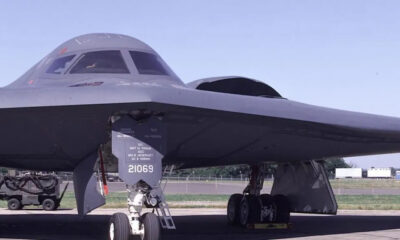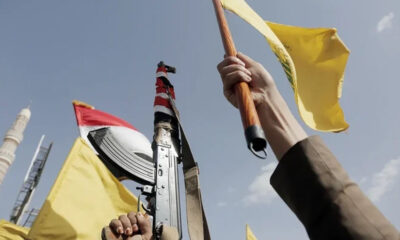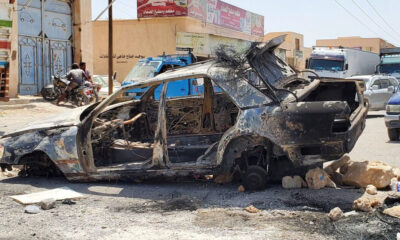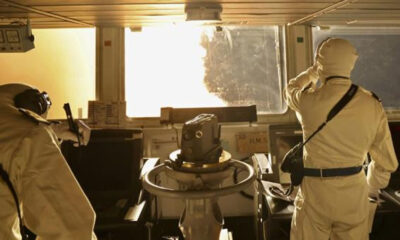International
Burning oil tanker towed from Yemen after Houthi attacks
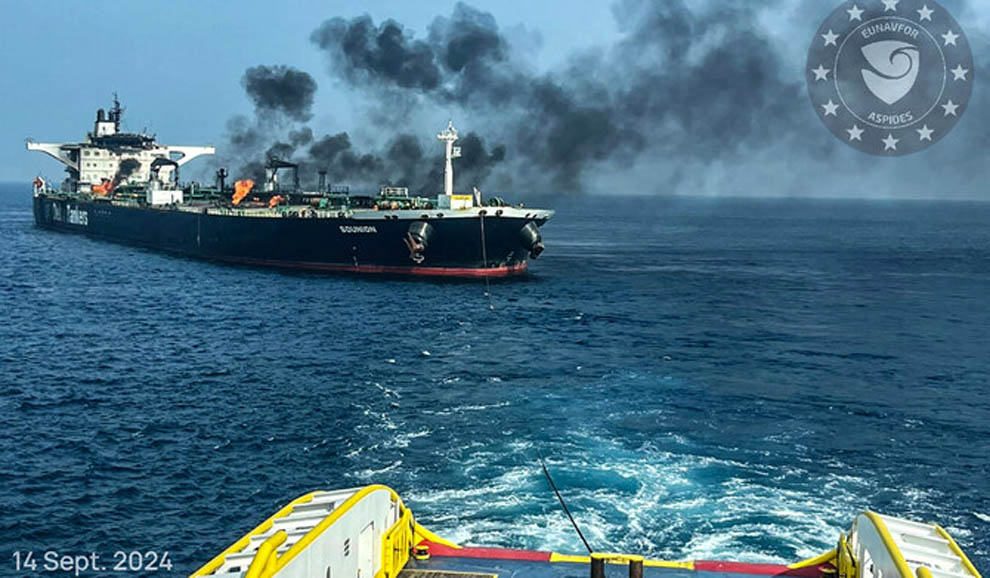
Burning oil tanker towed from Yemen after Houthi attacks
DUBAI, United Arab Emirates: Salvagers successfully towed a Greek-flagged oil tanker ablaze for weeks after attacks by Yemen’s Houthis to a safe area without any oil spill, a European Union naval mission said Monday.
The Sounion reached waters away from Yemen as the Houthis meanwhile claimed that they shot down another American-made MQ-9 Reaper drone, with video circulating online showing what appeared to be a surface-to-air missile strike and flaming wreckage strewn across the ground.
The two events show the challenges still looming for the world as it tries to mitigate a monthslong campaign by the militia over the Israel-Hamas war raging in the Gaza Strip. While the militia allowed the Sounion to be moved, they continue to threaten ships moving through the Red Sea, a waterway that once saw $1 trillion in goods move through it a year.
The EU naval mission, known as Operation Aspides, issued a statement via the social platform X announcing the ship had been moved.
The Sounion “has been successfully towed to a safe area without any oil spill,” the EU mission said. “While private stakeholders complete the salvage operation, Aspides will continue to monitor the situation.”
The Houthis had no immediate comment and it wasn’t clear where the vessel was, though it likely was taken north away from Yemen. Salvagers still need to offload some 1 million barrels of crude oil aboard the Sounion, which officials feared could leak into the Red Sea, killing marine life and damaging corals in the waterway.
Meanwhile, the US military said it was aware of the Houthis’ claimed downing of a drone over the country’s southwestern Dhamar province, without elaborating.
READ ALSO:
- Why I’ll work against Obi as running mate – Aisha Yesufu
- Putin orders third increase in Russian troops after Ukraine invasion
- We no longer recognise Abure as Labour Party chairman – INEC
The Houthis have exaggerated claims in the past in their ongoing campaign targeting shipping in the Red Sea over the Israel-Hamas war. However, the online video bolstered the claim, particularly after two recent claims by the Houthis included no evidence.
Other videos showed armed Houthi members gathered around the flaming wreckage, a propeller similar to those used by the armed drone visible in the flames. One attempted to pick up a piece of the metal before dropping it due to the heat.
Brig. Gen. Yahya Saree, a Houthi military spokesperson, identified the drone as an MQ-9, without elaborating on how he came to the determination. He said it was the third downed by the group in a week, though the other two claims did not include similar video or other evidence. The US military similarly has not acknowledged losing any aircraft.
Saree said the Houthis used a locally produced missile. However, Iran has armed the militia with a surface-to-air missile known as the 358 for years. Iran denies arming the Houthis, though Tehran-manufactured weaponry has been found on the battlefield and in seaborne shipments heading to Yemen despite a United Nations arms embargo.
Reapers, which cost around $30 million apiece, can fly at altitudes up to 50,000 feet (15,240 meters) and have an endurance of up to 24 hours before needing to land. The aircraft have been flown by both the US military and the CIA over Yemen for years.
The Houthis have targeted more than 80 merchant vessels with missiles and drones since the war in Gaza started in October. They seized one vessel and sank two in the campaign that has also killed four sailors. Other missiles and drones have either been intercepted by a US-led coalition in the Red Sea or failed to reach their targets, which have included Western military vessels as well.
The Houthis maintain that they target ships linked to Israel, the US or the UK to force an end to Israel’s campaign against Hamas in Gaza. However, many of the ships attacked have little or no connection to the conflict, including some bound for Iran.
The Houthis also published footage Monday of what they have claimed was a hypersonic missile that they used to attack Israel on Sunday. Parts of the missile landed in an open area in central Israel and triggered air raid sirens at its international airport, but injured no one. Israeli Prime Minister Benjamin Netanyahu has threatened to retaliate over the attack the Houthis launched with the Palestine 2 missile.
Burning oil tanker towed from Yemen after Houthi attacks
ARAB NEWS
International
Israeli strikes pound central Beirut, suburbs
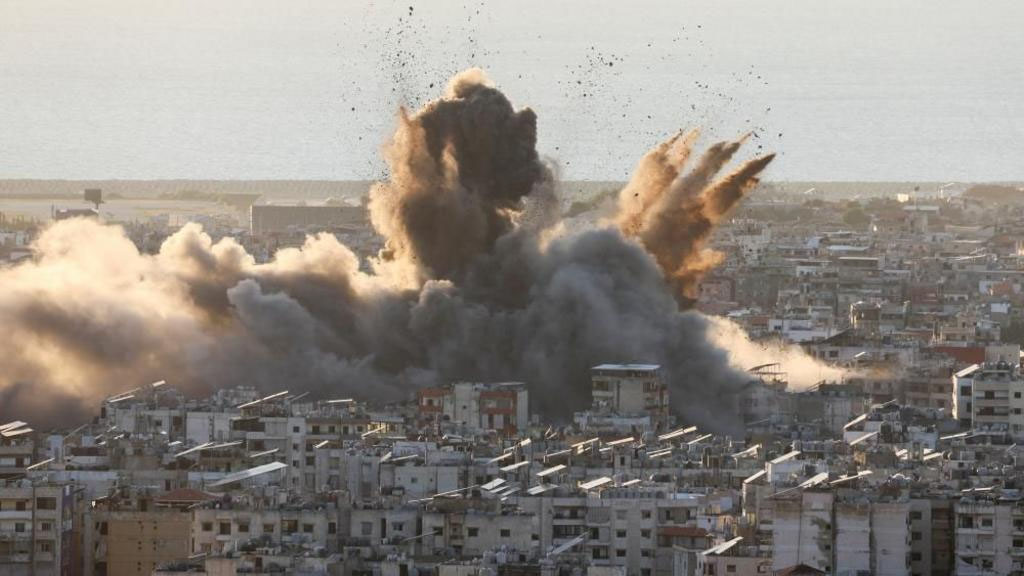
Israeli strikes pound central Beirut, suburbs
BEIRUT: Israeli strikes pounded a densely-populated part of the Lebanese capital and its southern suburbs on Tuesday, hours ahead of an anticipated announcement of a ceasefire ending hostilities between Israel and Lebanese armed group Hezbollah.
A strike on Beirut hit the Noueiri district with no evacuation warning and killed at least one person, Lebanon’s health ministry said in a preliminary toll.
READ ALSO:
- French football star, Paul Pogba’s blackmail trial begin in Paris
- French football star, Paul Pogba’s blackmail trial begin in Paris
- Vigilante arrested in Anambra for robbery
Minutes later, at least 10 Israeli strikes hit Beirut’s southern suburbs. They began approximately 30 minutes after the Israeli military issued evacuation orders for 20 locations in the area, the largest such warning yet.
As the strikes were under way, Israel’s military spokesperson Avichay Adraee said the air force was conducting a “widespread attack” on Hezbollah targets across the city.
Israeli strikes pound central Beirut, suburbs
ARAB NEWS
International
Over $100m wasted, Trump mocks Democrats for targeting him

Over $100m wasted, Trump mocks Democrats for targeting him
Former U.S. President Donald Trump has fiercely criticised the legal cases brought against him, calling them “empty and lawless”.
He accused Democrats of weaponising the judicial system to target him as a political opponent.
In a strongly worded statement, Trump alleged that over $100 million in taxpayer money had been wasted in what he described as a politically driven effort to undermine his influence.
“Nothing like this has ever happened in our Country before,” he said, pointing to high-profile prosecutors, including Georgia’s Fani Willis and New York Attorney General Letitia James, as key figures in what he called a “political hijacking.”
READ ALSO:
- PH refinery: 200 trucks will load petroleum products daily, says Presidency
- US-based Nigerians get 30-year sentence over $3.5m romance scam
- 4 Nigerians arrested in Libya for alleged drug trafficking, infection charges
Trump also accused Willis of colluding with Nathan Wade, whom he described as “her lover” and lacking the experience to handle such cases.
He claimed Wade was paid “millions,” allegedly enabling lavish trips and cruises.
Letitia James, who is pursuing a civil fraud case against Trump, was also criticised.
He claimed she had campaigned on a promise to “get Trump” in her bid for office, an action he labelled “unethical” and “probably illegal.”
Trump also mentioned Manhattan District Attorney Alvin Bragg, alleging that Bragg initially resisted prosecuting him but was pressured into action by the Justice Department and the Democratic Party.
Describing the series of legal actions as a “low point in the history of our Country,” Trump maintained his resolve, declaring: “I persevered, against all odds, and WON.”
Over $100m wasted, Trump mocks Democrats for targeting him
International
US-based Nigerians get 30-year sentence over $3.5m romance scam
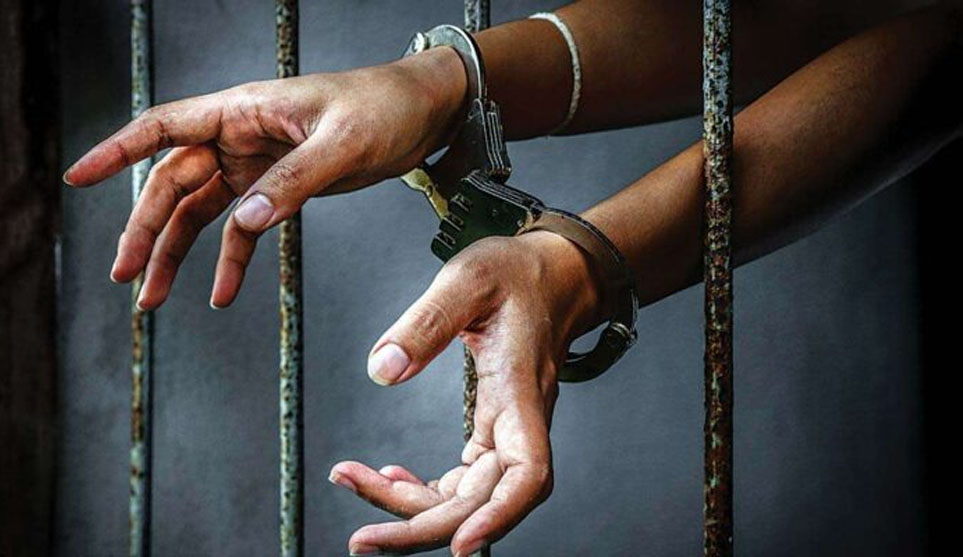
US-based Nigerians get 30-year sentence over $3.5m romance scam
A United States federal jury sentenced two Nigerians, Anthony Ibekie and Samuel Aniukwu, to 30 years in prison for scamming certain US citizens $3,500,000.
This was mentioned in a news statement made public on the US Department of Justice website on Monday.
According to the statement, the Nigerians, Ibekie and Aniukwu mislead their victims by informing them that they had received big inheritances that required payment to claim.
The couple would then ask their victims to transfer money, promising to refund them after the inheritances were claimed.
It also stated that the duo carried out romance scams by establishing romantic relationships with their victims and demanding them to send money after they had built trust in their victims.
It read, “An undercover law enforcement investigation has resulted in federal prison sentences for two Nigerian nationals residing in the Chicago suburbs who conducted online inheritance scams and other fraud schemes.
“Using aliases, Anthony Emeka Ibekie and Samuel Aniukwu communicated with victims throughout the United States, convincing them they had received substantial inheritances and needed to send money to individuals associated with the defendants in order to claim it.
“In addition to the inheritance scam, the pair carried out an online romance scam that involved communicating with victims via social media and dating websites, building trust with the victims through a purported online romance, and convincing them to send money to a predetermined recipient. Aniukwu and Ibekie also orchestrated a ‘business email compromise’ scam that targeted corporate email accounts.
READ ALSO:
- 4 Nigerians arrested in Libya for alleged drug trafficking, infection charges
- BREAKING: Port Harcourt refinery begins operation
- Damagun writes INEC to conduct by-election for 27 vacant Rivers assembly seats
“The fraud schemes were uncovered by a covert law enforcement investigation. The scams resulted in losses to victims of at least $3.5 million.”
According to the statement, after being arraigned on 14 charges, the duo pleaded guilty to their different alterations.
Following their guilty pleas, Ibekie was sentenced to 20 years in prison on Thursday, and Aniukwu was sentenced to 10 years in prison on November 8.
The statement continued, “A federal jury earlier this year convicted Ibekie, 59, of Oswego, Illinois, on all 14 counts of wire fraud, mail fraud, money laundering, making false statements to a bank, and passport fraud. U.S. District Judge Steven C. Seeger on Thursday sentenced Ibekie to 20 years in federal prison.
“Aniukwu, 50, of Romeoville, Illinois, pleaded guilty last year to wire fraud and money laundering charges. Judge Seeger on Nov. 8, 2024, sentenced Aniukwu to 10 years in prison.”
Meanwhile, Jennifer Gosha, an accomplice of the Nigerians and a US citizen, is expected to be sentenced on December 18 after pleading guilty.
“A third defendant, Jennifer Gosha, 52, a U.S. citizen from Oak Park, Ill., pleaded guilty earlier this year to charges of wire fraud and making false statements to a federal agent. Gosha is scheduled to be sentenced by Judge Seeger on December 18, 2024,” the statement concluded.
US-based Nigerians get 30-year sentence over $3.5m romance scam
-

 metro21 hours ago
metro21 hours agoBREAKING: Port Harcourt refinery begins operation
-

 Business3 days ago
Business3 days agoJust in: Dangote refinery reduces petrol price for marketers
-

 metro2 days ago
metro2 days ago40-foot container falls on car in Lagos
-

 Politics3 days ago
Politics3 days ago2027: Lagos Speaker, Obasa joins gov race, may battle Seyi Tinubu, others
-

 Politics2 days ago
Politics2 days agoLagos 2027: Seyi Tinubu campaign team releases his life documentary
-

 International2 days ago
International2 days agoTrump to sack 15,000 transgender officers from U.S. military: Report
-

 Entertainment2 days ago
Entertainment2 days agoPolygamy best form of marriage for Africa – Okey Bakassi
-

 Education14 hours ago
Education14 hours agoUS University opens 2025 scholarships for international students

